It’s taken me a while to compose my thoughts about my visit to Abkhazia last Autumn, lest even consider writing about them. However, I have recently come to realise that my trip, despite feeling on edge the entire time, was too littered with instances of shaking my head in bewilderment that I was in such a place, and having such bizarre experiences, for me not to spew it out into some sort of prose. Visiting places like this truly make me feel like I am in the “arse end of nowhere”, which is a feeling I’ve come to like. But, I’m in two minds about whether I actually liked Abkhazia. If I was pushed, I’d probably go with “no”. Similarly, if I was asked if I’d recommend going, I’d probably reply “ehh, not really”. But, am I glad that I went, and did I pick up some of my craziest travel memories? Absolutely. Akin to my post on Kosovo, I’m not going to get into the politics of the area. I’ve read enough about it, and spoken to enough people, to form my own opinions, and would encourage anyone reading this to do the same. For example, Svetlana Alexievich’s book Secondhand Time, a book full of monologues of those experiencing the fall of the USSR, is well worth reading for some personal accounts, and needless to say, Tbilisi, Georgia’s capital, is littered with slogans such as this:
Akin to my post on Kosovo, I’m not going to get into the politics of the area. I’ve read enough about it, and spoken to enough people, to form my own opinions, and would encourage anyone reading this to do the same. For example, Svetlana Alexievich’s book Secondhand Time, a book full of monologues of those experiencing the fall of the USSR, is well worth reading for some personal accounts, and needless to say, Tbilisi, Georgia’s capital, is littered with slogans such as this: It was a mild Saturday night when I left Tbilisi’s main train station, having booked a bed on the 21:45 sleeper train to Zugdidi, the city closest to the Abkhaz “border”. I was lucky enough to share the four-bed compartment with two friendly Polish ladies, who happened to be volunteering in Sukhumi, Abkhazia’s de-facto capital city, for what I gathered to be some type of Christian aid organisation. The priest from their church was picking them up in Zugdidi in the morning, and I was delighted to be offered a ride with them. As the Soviet-era train rattled slowly through the night, I managed to sleep a bit, snoozing through the noise and motion, but apparently not the sweaty, cigaretty stench of our fourth room-mate. Funnily enough, whenever he sat up, I knew about it.
It was a mild Saturday night when I left Tbilisi’s main train station, having booked a bed on the 21:45 sleeper train to Zugdidi, the city closest to the Abkhaz “border”. I was lucky enough to share the four-bed compartment with two friendly Polish ladies, who happened to be volunteering in Sukhumi, Abkhazia’s de-facto capital city, for what I gathered to be some type of Christian aid organisation. The priest from their church was picking them up in Zugdidi in the morning, and I was delighted to be offered a ride with them. As the Soviet-era train rattled slowly through the night, I managed to sleep a bit, snoozing through the noise and motion, but apparently not the sweaty, cigaretty stench of our fourth room-mate. Funnily enough, whenever he sat up, I knew about it.
A cosy, companionable atmosphere prevailed in Zugdidi station, when I alighted the train, bleary-eyed, at 6.45am the next morning, with passengers seemingly congregating in the main foyer to wait for their respective lifts. The girls had spoken to their priest, and he was not due to arrive until 9am, so I decided, after watching a chubby puppy caper about on a piece of string, to find a marshrutka to take me over to the checkpoint. Having read several blog posts on the entry procedures for Abkhazia, when I arrived at the border, still in semi-darkness, I knew to check in with the Georgian police, who were set up in a little room nearby. They told me the border didn’t open until 8 (probably the reason for the priest’s delay), but kindly let me sit inside their police station until then! Given previous accounts of surliness (unsurprising given the tensions), I was surprised by this, and I really didn’t expect to start my day sitting in a Georgian police station, watching Georgian-dubbed versions of a Frida Kahlo biography, and Over the Hedge. Stranger things *haven’t* happened, and this is the first of my several baffling anecdotes!
Unsurprisingly, I was the only tourist in sight when I was finally permitted to cross. The sun was up, and I was escorted across the Enguri river by a gang of friendly stray dogs. This was the first of three times I’d meet these dogs, as you’ll soon find out. Follow this link for a video of this welcome entourage (I can’t add videos directly to this post) https://youtu.be/zem4sCxvTIA
Getting to the little hut that marked the Abkhazia “border” was where my troubles began. I was told to wait. So I waited. And waited. All in all, I sat for about three hours on a small plastic chair, whilst hordes of people, from babies to babushkas, and their hordes of belongings horded through. To be fair, it was an interesting anthropological experience, and luckily, I had this furry friend to sit with me (https://youtu.be/GPVuvIfhCGY). The border guys were friendly, and let me use their WiFi, but it wasn’t long before my Polish friends and their priest showed up. I asked them to check what the delay was (my Russian is very poor). They said that, despite having my clearance letter all printed out, due to it being Sunday, poor administration meant that a) I wasn’t on their “list”, and b) they couldn’t contact the Abkhaz MFA to confirm my status as a bona fide tourist. I thanked them, sighed, collected my bags, and walked back across the bridge to get a bus back to Zugdidi. I wasn’t going to Abkhazia today.
After a quick marshrutka ride back to Zugdidi, I located some WiFi to find myself a cheap place to stay for the night. I found a guesthouse a short walk from the bus station, on Stalin Street to be precise, and took a very welcome shower, with the goal of trying again the next day. I walked out to find a well-needed khachapuri and a beer. I really felt like I was in deepest, darkest, Georgia in this city. No street lights illuminated Stalin Street, and I felt slightly unnerved as a pair of cows crossed the road in front of me to raid some nearby bins.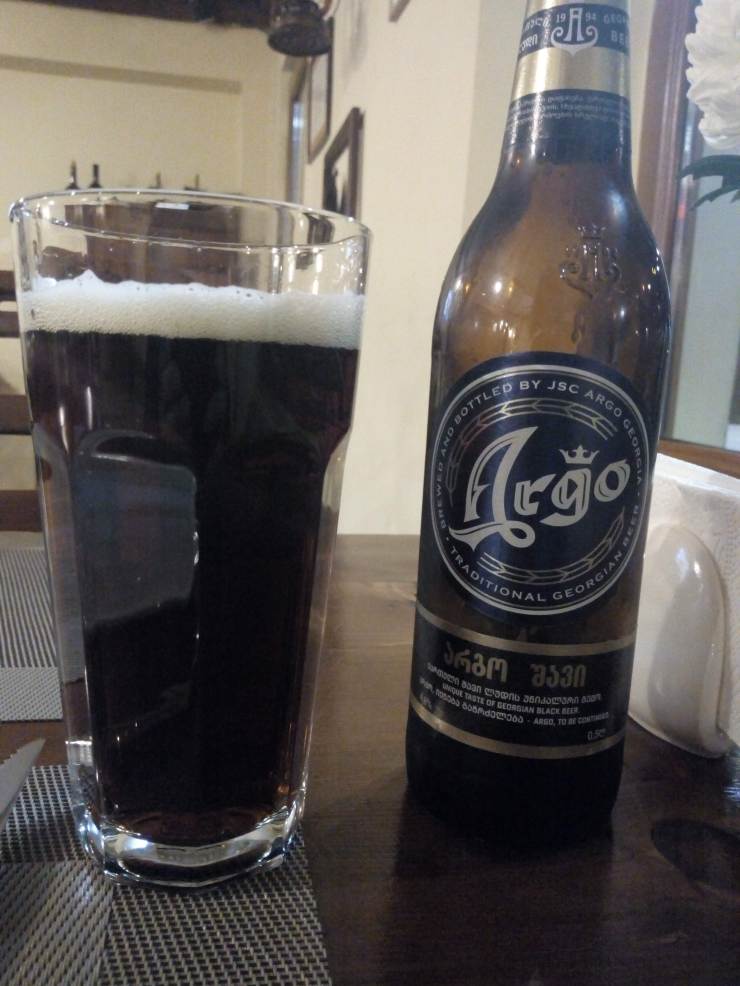 The next day, I was up bright and early to attempt the crossing again. A failure to find the marshrutka to Enguri meant getting a taxi, which was cheap, so not a problem. Before I knew it, I was sat outside the hut again, on my plastic chair. Charmingly, this sweet girl recognised me when I got off the bus as I’d given her some fuss the previous day (you can see her in the first video above), and tail wagging, followed me across the bridge, and helped me eat my khachapuri leftovers. I could have taken her with me.
The next day, I was up bright and early to attempt the crossing again. A failure to find the marshrutka to Enguri meant getting a taxi, which was cheap, so not a problem. Before I knew it, I was sat outside the hut again, on my plastic chair. Charmingly, this sweet girl recognised me when I got off the bus as I’d given her some fuss the previous day (you can see her in the first video above), and tail wagging, followed me across the bridge, and helped me eat my khachapuri leftovers. I could have taken her with me. 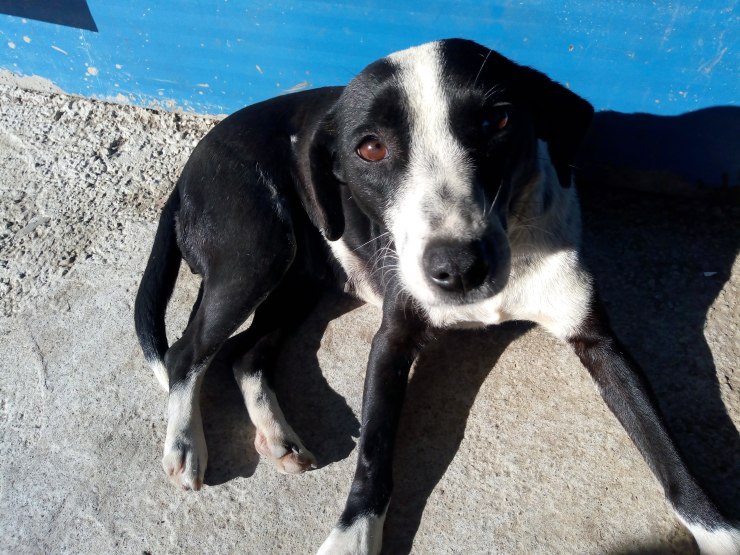 Luckily, my deja vous dispersed itself when I was eventually waved through. I was in! A quick bag check from the Russian guards later, I was on the lookout for a marshrutka to Sukhumi, where I was staying for the next few nights. There wasn’t one, however a chat with a lovely lady confirmed that I could change buses in Gali. Gali is supposedly the poorest area of Abkhazia, with crime and poverty rife. I was a little hesitant to be stopping there, but the locals and bus drivers remained friendly and helpful, even helping me break my 1000 ruble note in a nearby shop so I could pay the driver the 50 ruble (£0.64) fare. I also got chatting to a little old lady, who was also waiting for the marshrutka to Sukhumi, in broken English and Russian. She kindly warded off the dodgy looking taxi drivers who had sensed my presence, and upon finding out I was British, proudly announced that she was Georgian. In fact, most of the Georgian population of Abkhazia now live in the Gali district.
Luckily, my deja vous dispersed itself when I was eventually waved through. I was in! A quick bag check from the Russian guards later, I was on the lookout for a marshrutka to Sukhumi, where I was staying for the next few nights. There wasn’t one, however a chat with a lovely lady confirmed that I could change buses in Gali. Gali is supposedly the poorest area of Abkhazia, with crime and poverty rife. I was a little hesitant to be stopping there, but the locals and bus drivers remained friendly and helpful, even helping me break my 1000 ruble note in a nearby shop so I could pay the driver the 50 ruble (£0.64) fare. I also got chatting to a little old lady, who was also waiting for the marshrutka to Sukhumi, in broken English and Russian. She kindly warded off the dodgy looking taxi drivers who had sensed my presence, and upon finding out I was British, proudly announced that she was Georgian. In fact, most of the Georgian population of Abkhazia now live in the Gali district.
Right on time, our marshrutka showed up, and we were soon on our way to Sukhumi. I got my first proper views of the tragic Abkhaz landscape. Huge manor houses lay in ruins, and like I was to find across my whole time there, decay and abandonment were everywhere. I don’t think I have ever seen a more desolate, forgotten, corner of the world. I got off the marshrutka in the leafy centre of Sukhumi to raucous laughter from the passengers. The driver asked me a question, which obviously I didn’t understand, so just kind of nodded acknowledgement. This was apparently ridiculously funny, so I can only imagine what he said! Time to pick up my visa. Although tourists are required to apply for entry clearance online, which is printed and shown to the border guards, it’s still necessary to collect an actual visa from the Ministry of Foreign Affairs in Sukhumi. After circling the area a bit trying to find it, a kind young army recruit drew me a map, and I was eventually there, visa in hand. I got talking to a German guy who was there extending his, due to trying to adopt a stray puppy. Due to bureaucracy, it was taking a hell of a long time, and he was getting worried the dog was growing too much to allow him to transport him/her by bike! I wonder how they got on. He was staying with a local family, who also offered me accommodation, which I said I already had. I still got a lift to my apartment, however!
Time to pick up my visa. Although tourists are required to apply for entry clearance online, which is printed and shown to the border guards, it’s still necessary to collect an actual visa from the Ministry of Foreign Affairs in Sukhumi. After circling the area a bit trying to find it, a kind young army recruit drew me a map, and I was eventually there, visa in hand. I got talking to a German guy who was there extending his, due to trying to adopt a stray puppy. Due to bureaucracy, it was taking a hell of a long time, and he was getting worried the dog was growing too much to allow him to transport him/her by bike! I wonder how they got on. He was staying with a local family, who also offered me accommodation, which I said I already had. I still got a lift to my apartment, however!
A bit about where I stayed in Sukhumi. I often use the site Couchsurfing when I travel, and I could sing it’s many praises here, but I won’t. I never actually met the first of my two “hosts” in Abkhazia, who was a Russian lady mostly stationed in St Petersburg. However, she often let Couchsurfers use her Sukhumi apartment, in a typical Soviet “Khrushchyovka” block, which was my home for three nights. It was cosy, and I was able to wash my clothes and get a good rest. The evening was getting on and I didn’t feel like wandering around in the dark, so after a quick trip to the grocery store, I called it a night.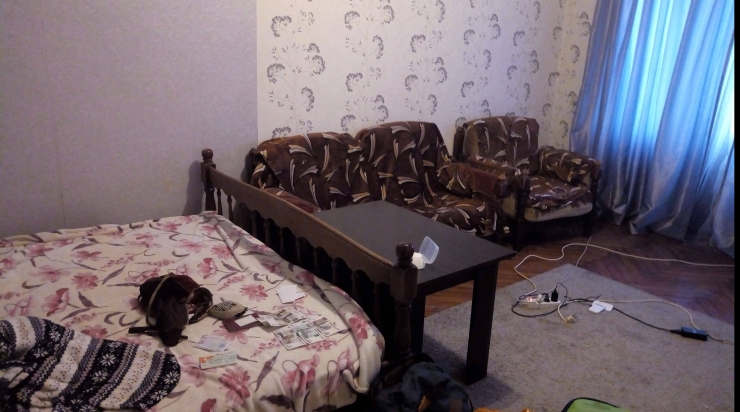
 In the morning, I made my way to the seafront, which is almost visible from the photo above, if you peek through the trees at the end of the road. I planned to walk along the promenade and view the famous Sukhumi pier.
In the morning, I made my way to the seafront, which is almost visible from the photo above, if you peek through the trees at the end of the road. I planned to walk along the promenade and view the famous Sukhumi pier.
Although I wasn’t feeling hugely brave with the idea of delving too deeply into Sukhumi’s abundance of abandoned buildings, I did have a wander through two train stations: one in use, with a regular train from Moscow passing through, and acting as the city’s makeshift bus station:
 The other, not so much.You can only imagine how grand these buildings were in their heyday.
The other, not so much.You can only imagine how grand these buildings were in their heyday.
The next day involved a trip to Akhali Atoni/Novi Afon/New Athos. It was an easy marshrutka ride from the aforementioned makeshift bus station, and I had a really beautiful day here. The sun was out,and there were plenty of other tourists enjoying the attractions of the little town. I was greeted off the bus by the below monstrosity (yes, it’s a bus stop), and was soon on my way to visiting the three main attractions of the town: monastery, waterfall, fortress.
 An easy walk led me through a small souvenir market place (had to buy a magnet, of course), to the beautiful monastery. It really did feel a million miles away from grubby, dilapidated Sukhumi.
An easy walk led me through a small souvenir market place (had to buy a magnet, of course), to the beautiful monastery. It really did feel a million miles away from grubby, dilapidated Sukhumi.
 After a brief tea stop, it was time to take a peak at the waterfall, lagoon, and nearby abandoned, but picturesque, railway station. Here’s a bit of a photo dump. It really was a glorious day.
After a brief tea stop, it was time to take a peak at the waterfall, lagoon, and nearby abandoned, but picturesque, railway station. Here’s a bit of a photo dump. It really was a glorious day.
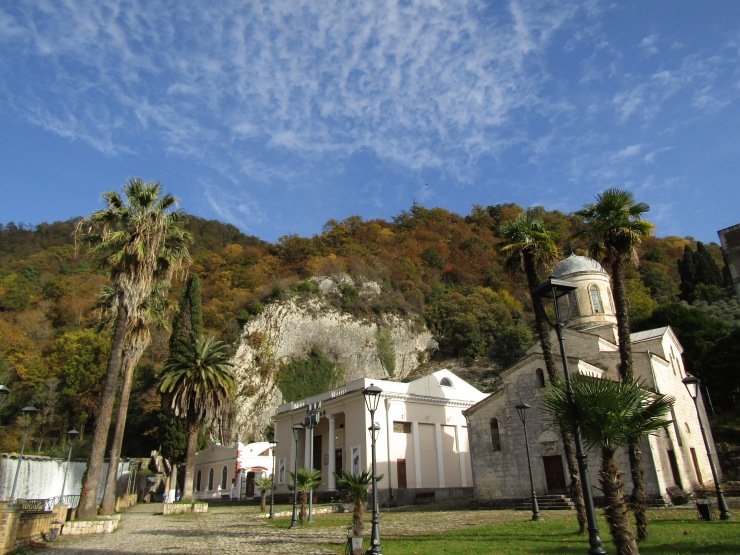

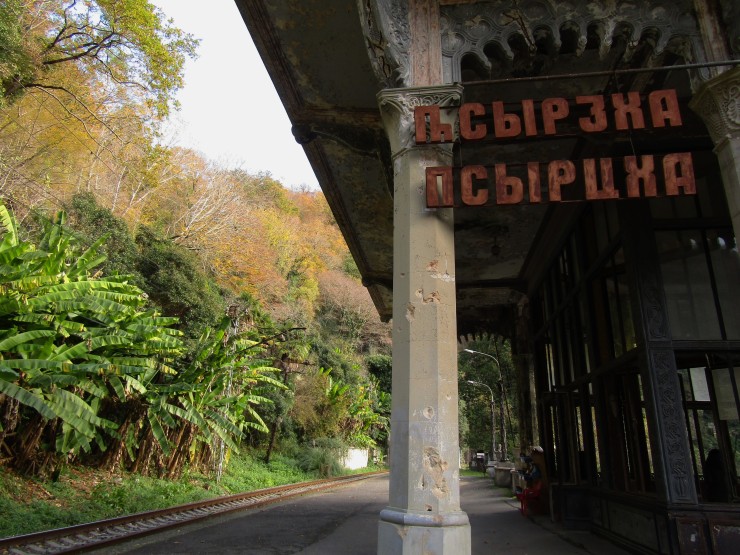

 Next came a fairly long walk up to the fortress. Again, there were plenty of (Russian) tourists around, and I felt pretty safe. I went past an abandoned hotel, just for good measure, before climbing the serpentine path up to the top.
Next came a fairly long walk up to the fortress. Again, there were plenty of (Russian) tourists around, and I felt pretty safe. I went past an abandoned hotel, just for good measure, before climbing the serpentine path up to the top.


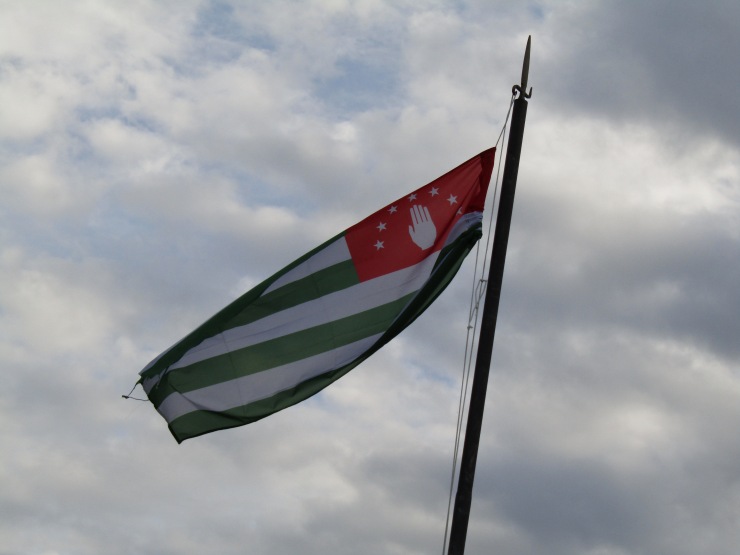
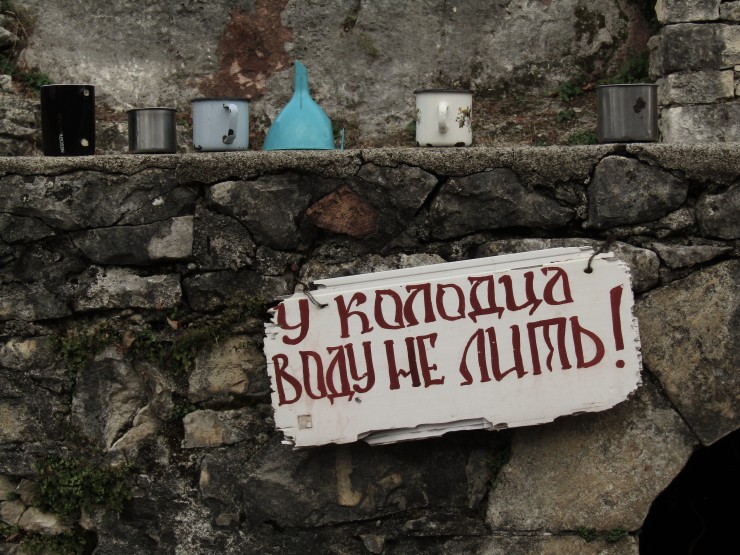
Part two of my journey was a lesson in kindness that I’ll never forget. For the second half of the trip, I had another Couchsurfing experience, which turned out to be one of my best. I was offered a place to stay by a teenage girl, let’s call her Anna (I’ll change all names from here onwards). Anna herself was away studying at university in Russia, but she kindly arranged for her parents, Joanna and Peter, and her sister Irene, to host me in her absence. I was a little nervous to travel to the middle of nowhere in Abkhazia, and stay for two nights with a family who spoke no English, but I hopped on a marshrutka anyway (I’d left most of my things at the flat in Sukhumi to collect before my departure), and was met at the bus stop by Joanna and Peter in their ancient Lada. Upon arriving at their little house, I was greeted with a huge meal, copious amounts of homemade wine, and … pickle juice. I had a cosy bedroom upstairs, heated by the wood stove below, and spent a wonderful two nights getting to know the three of them, with the help of Google Translate. We had plenty of laughs with wine and Uno at night, and I couldn’t have asked for a more welcoming experience in such an unlikely, lonely destination. I am still in touch with the family now, mainly through sending each other cute GIFs on Instagram. I won’t post many photos of their home, but here is kitty helping us eat dinner.
 I spent a good chunk of the next two days in the house with the family, soaking it up as much as I could, although visits were made to the nearby beach, and the neighbouring town of Gudauta. I felt a little conspicuous on both trips, wanting to photograph everything from the garish Soviet buildings, to the familiar abandoned train station, but not daring to take my camera out as much as I wanted to. Gudauta seemed to be a very ordinary, functioning town, with gaggles of children finishing school for the day in the autumnal drizzle.
I spent a good chunk of the next two days in the house with the family, soaking it up as much as I could, although visits were made to the nearby beach, and the neighbouring town of Gudauta. I felt a little conspicuous on both trips, wanting to photograph everything from the garish Soviet buildings, to the familiar abandoned train station, but not daring to take my camera out as much as I wanted to. Gudauta seemed to be a very ordinary, functioning town, with gaggles of children finishing school for the day in the autumnal drizzle.
Phase three turned out to be the most surreal leg by far. As I mentioned earlier, I left my bags at the apartment in Sukhumi, where I’d be staying again for my last night in Abkhazia. The owner of the apartment, who I’d be in contact with the whole trip, arranged for a friend of hers to take me on a day trip. Let’s call him Grigory. Grigory was a super cool yoga teacher hailing from the far eastern islands of Russia. They’d got wind that I liked abandoned buildings, so he wanted to show me an abandoned mining village, called Tkvarcheli. I felt really, really, iffy about going here, as a couple I know from a Facebook travel group I’m a part of, had recently had a terrible experience visiting there, where they were robbed (read about it here : https://www.kathmanduandbeyond.com/worst-experience-travel-mugged-robbed-abkhazia/). But I was assured that with a Russian speaker I’d be absolutely fine. I was absolutely fine, just putting that out there now, for anyone who’s on the edge of their seat, but it took a good chunk of the day, and a couple of beers along, for me to relax. I’m not particularly proud of myself for going so against my gut instinct, but there we are. I’m alive.
A bus took us to a crossroads on the highway, where we, too my horror, started hitchhiking towards Tkvarcheli. ANOTHER pair I’d read about had been mugged/threatened doing this very same thing, and yes, I was one step away from pooping myself when we were picked up by some shouty guys, all gold rings and chained, in a bashed out car. Grigory was totally calm and reassuring, and we were safely deposited in the desolate streets of Tkvarcheli. We didn’t end up going down to the abandoned factories, which was probably a good thing, but we got a good view of it, and the connecting (decommissioned) cable car from atop the hill.

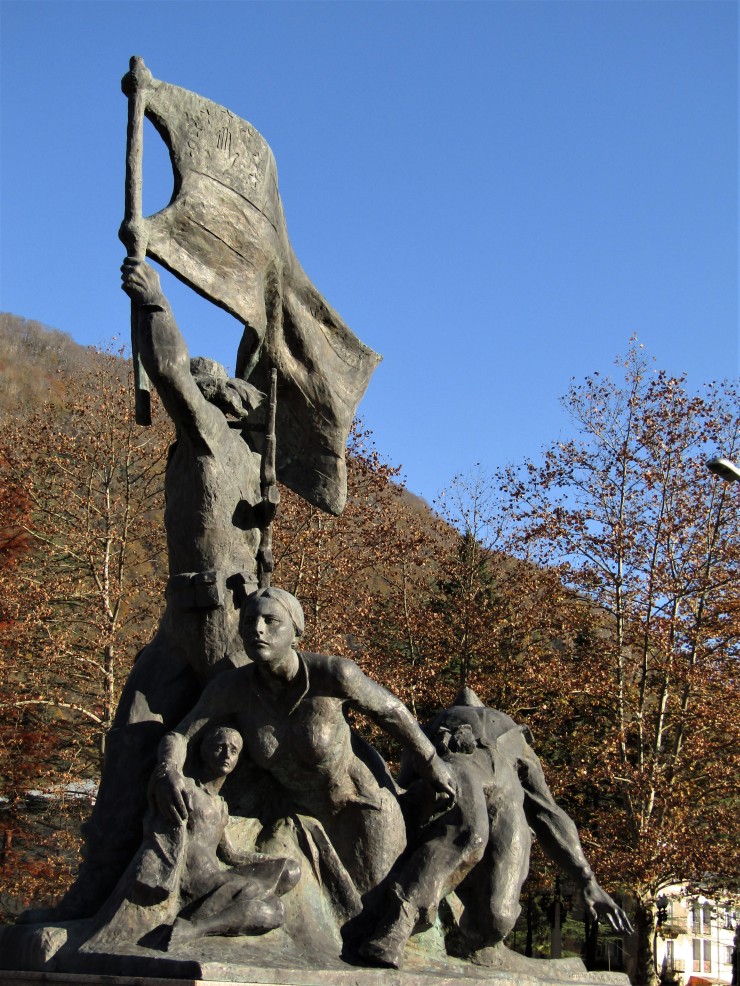 Walking through Tkvarcheli, a work truck (Gaz type or something similar) pulled up next to us, and the young guys began talking to Grigory. I saw them look awestruck at the point when he explained I was British, and they offered to take us to a waterfall and to show us a hotel that they were building, if we paid a nominal fee for petrol. Again, I felt a bit funny about it, but agreed anyway (!). Shortly after a quick drive via their work office to collect some bottles of Budweiser for us all, we arrived at a point to start a brief hike to the waterfall. The guys in the truck were obviously bemused to hang out with a British girl, and it turned into a mildly creepy scenario of “who can be the loudest”, but it was annoying at most, and definitely the worst thing that happened that day. The area was breathtaking. We joined up with a tourist family for the walk, who ended up kindly giving Grigory and I a lift back to Sukhumi that evening.
Walking through Tkvarcheli, a work truck (Gaz type or something similar) pulled up next to us, and the young guys began talking to Grigory. I saw them look awestruck at the point when he explained I was British, and they offered to take us to a waterfall and to show us a hotel that they were building, if we paid a nominal fee for petrol. Again, I felt a bit funny about it, but agreed anyway (!). Shortly after a quick drive via their work office to collect some bottles of Budweiser for us all, we arrived at a point to start a brief hike to the waterfall. The guys in the truck were obviously bemused to hang out with a British girl, and it turned into a mildly creepy scenario of “who can be the loudest”, but it was annoying at most, and definitely the worst thing that happened that day. The area was breathtaking. We joined up with a tourist family for the walk, who ended up kindly giving Grigory and I a lift back to Sukhumi that evening.
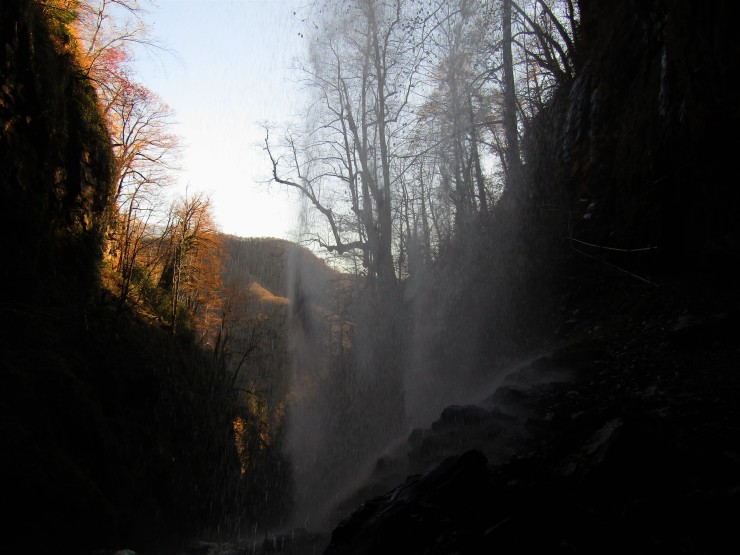
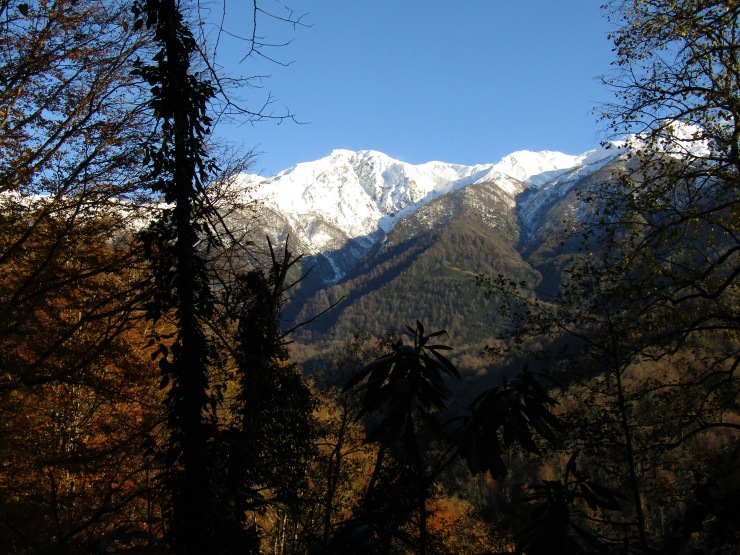

Lastly, we were treated to an insider view of the hotel/spa they were involved in building. I found a kitten friend, and having drank some fragrant alcoholic substance from tea-cups, six of us piled into a four-seater car for the ride back to Sukhumi. What a crazy day!
My journey back to Tbilisi the next morning was horrendous, and I haven’t really been able to think much about it until recently, because of how scared and helpless I felt. Here comes a wall of text.
Things were going okay, when I arrived at the bus station in Sukhumi in the morning, to wait for the bus to Gali to head back to the border. I chatted with a kind old man who insisted on buying me a coffee, and headed off to try and find a toilet as I had a little bit of time to wait before the marshrutka was due. I was unsuccessful, so turned back to see a police car waiting. Yes, it was for me. I was told to show my visa and passport, and was told to get in the police car. I did so, my stomach turning. The robbings I mentioned above were suspected to have had corrupt cop involvement, and the last thing I wanted was to be alone in a car or a room with such people. We drove literally across the road to a small police station, where some calls were made. One cop was horrible. A short, fat, toad of a man. When I asked if everything was okay, he repeated it in a sing-song mocking voice and laughed. He also kept saying that I shouldn’t be going to Enguri, I should go to Psou (the border crossing with Russia). “Ya Ruski visa – njet” I said. I think he got bored in the end. His younger colleague, however, the one making the calls, was kinder, and although still a bit gruff, reassured me that I wouldn’t miss my bus. It was due to leave at 8.45 and time was pushing on now. However, I remained terrified, and the ten minutes or so I was there felt like a lifetime. I had visions of all kind of things happening, and with no consular support available in the lawless Abkhazia, I was truly scared. I think I hid it well though, and hopefully didn’t give toad-guy any satisfaction in intimidating me. At about 8.43, they finally said I could go – toady laughing as I picked up my bags and rushed out. As I left the police station premises, I saw my marshrutka pulling out of the bus station! Instinct took over with not wanting to be in this godforsaken place anymore, and I RAN LIKE HELL for that bus, and hit the side of it hoping they’d let me on. They did.
Feeling terrified that something else was going to happen to me at the border (yes, another horror story I’d read online), I was pretty shaken for the whole trip back to the border. The changeover in Gali was again uneventful, and I had managed to text my dad from the police station (felt slightly reassured when the cops didn’t give a shit that I had my phone out), and remained in contact with him until I was back in Tbilisi. As a seasoned dodgy-place traveller, with a number of false arrests under his sleeve, he was texting me every few seconds when I was in the queue to leave Abkhazia, asking me how many people were in front of me, so he’d know when I was at the front. Happily, everything went smoothly, and I stepped across feeling relieved. I was probably worrying over nothing, but given others’ recent experiences, I felt hugely heightened the whole time. It probably was just a routine document check, as I was informed later, and they were just making sure that I’d be able to cross back that day. I had my suspicions that they were in collusion with the taxi drivers at the station, so that I’d miss my bus, forcing me to take one and probably get ripped off horribly (or worse). Either way, it didn’t work, but I’ve mulled that situation over in my mind, going mad over the thought of what could have happened to me had I missed that marshrutka. I’ve satisfied myself with the idea that I would have just walked back to the apartment and tried again the next day. I did have a few days left on my visa, after all.
My story ends with meeting my doggy friend, happy as ever, back at the point where I was watching movies with the Georgian cops. I was about to get on a marshrutka directly back to Tbilisi, when I got talking to an English (yes, an English) guy, who often works in Abkhazia on peace-keeping type projects. His company had hired him a car to drive him back to Tbilisi, and I was welcome to join. I sped away in my free taxi, heading towards my favourite city in the world, thinking “yep, I’m never going there again”.



















